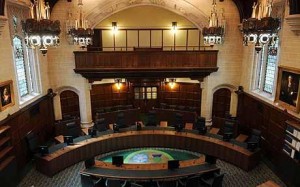Share it
 The Supreme Court was due to hear the appeal in R v McGeough on 9 July 2015, which challenges the decision of the Court of Appeal of Northern Ireland to affirm Mr McGeough’s convictions for attempted murder, possession of firearms with intent to commit an indictable offence, and two counts of membership of the IRA covering the period from 1 January 1975 until 14 June 1981.
The Supreme Court was due to hear the appeal in R v McGeough on 9 July 2015, which challenges the decision of the Court of Appeal of Northern Ireland to affirm Mr McGeough’s convictions for attempted murder, possession of firearms with intent to commit an indictable offence, and two counts of membership of the IRA covering the period from 1 January 1975 until 14 June 1981.
Background
Mr McGeough was convicted of offences based on his alleged involvement in an incident on 13 June 1981, where two IRA gunmen were said to have fired on a postman as he attempted to deliver a letter to a house. The postman managed to return fire, and hit one of the gunmen. A man matching Mr McGeough’s description was later treated for a gunshot wound in a nearby hospital. He subsequently escaped from the hospital while under guard.
Mr McGeough was brought to the attention of British authorities on various occasions after this incident. In 1983 he applied for political asylum in Sweden, which was rejected. He was later detained for trial in relation to offences allegedly committed in Germany, where he was interviewed by an RUC District Inspector who informed him that British authorities had obtained documents relating to his asylum application. The authorities suggested that the documents were proof of his IRA membership and involvement in the assassination attempt.
Mr McGeough was not convicted of any offences in Germany, but was later extradited to the United States, where he pleaded guilty to moving weapons between states without a licence. He returned to Ireland after release in 1996, and in March 2007 unsuccessfully contested an election for an assembly seat in Fermanagh and South Tyrone. He was arrested and charged with offence on the day of the election count.
Mr McGeough appeal did not dispute the facts in the Court of Appeal. Instead, he submitted that the charges against him had been an abuse of process due to the passage of time and because of an unequivocal promise he claimed to have received from the executive that he would not be liable to prosecution if he returned to Northern Ireland.
In addition, he submitted that the learned trial judge ought not to have admitted materials linked to an application for asylum in Sweden in 1983. He suggested that assertions in asylum applications were unreliable as applicants were prone to exaggeration. He also contended that no caution had proceeded the comments made and that these statements had been made under compulsion. He further suggested that using these statements for criminal prosecution purposes would create a future chilling effect for individuals making asylum applications.
The Court of Appeal’s decision
The Court of Appeal did not accept the appellant’s assertion that time began to run for the purposes of ECHR, art 6, at the time that he was first interviewed by police officers in Germany in 1991, as they had no power in that jurisdiction. It relied on the judgment of Lord Bingham in Attorney General’s Reference (No 2 of 2001) [2003] UKHL 68, which had stated that time generally runs from the point at which a person is charged or summoned.
In any case, the court accepted that the appellant had contributed substantially to the delay because he had left the jurisdiction and had not returned until the late 1990s. The delay in him coming to the attention of the police upon his return was to be considered the responsibility of the appellant.
The court further held that the trial judge had not been wrong to dismiss the appellant’s submission on non-prosecution assurances and had correctly applied the test in R v Abu Hamza [2007] QB 659. It did not consider that there was sufficient evidence to conclude that there had been an unequivocal promise by a member of the executive that would make it an offense to justice to advance proceedings against him.
Finally, the court dismissed the appellant’s arguments about the Swedish asylum application, holding that the trial judge had correctly considered whether the trial fairness would have been adversely impacted by the admission of this evidence. The appellant had alluded to Council Directive 2005/85/EC, arts 22 and 41, which prevented asylum information disclosure and provided for confidentiality, but the Court held that this had not applied in 1990 when the British authorities had obtained the information from Swedish officials.
The appeal in the Supreme Court
The Supreme Court had to consider whether the Court of Appeal erred in law in refusing to exclude admissions made by the Applicant in the course of his asylum application in Sweden. Whether the Directive on minimum standards on procedures for granting and withdrawing refugee status does allow the use of material for the purpose of proper criminal investigation may be central to their ultimate determination on whether the appellant’s conviction is safe.
The court may also have to decide whether the trial judge was correct to give weight to the fact that the asylum application evidence was lawfully obtained in accordance with international conventions at the time.
Finally, the court may need to determine whether the trial judge and the Court of Appeal were correct to give weight to evidence that the appellant had had access to a lawyer and was not compelled to make the statements he did in applying for asylum. It has been the appellant’s contention that permitting these statements as evidence in a criminal trial is unfair.

